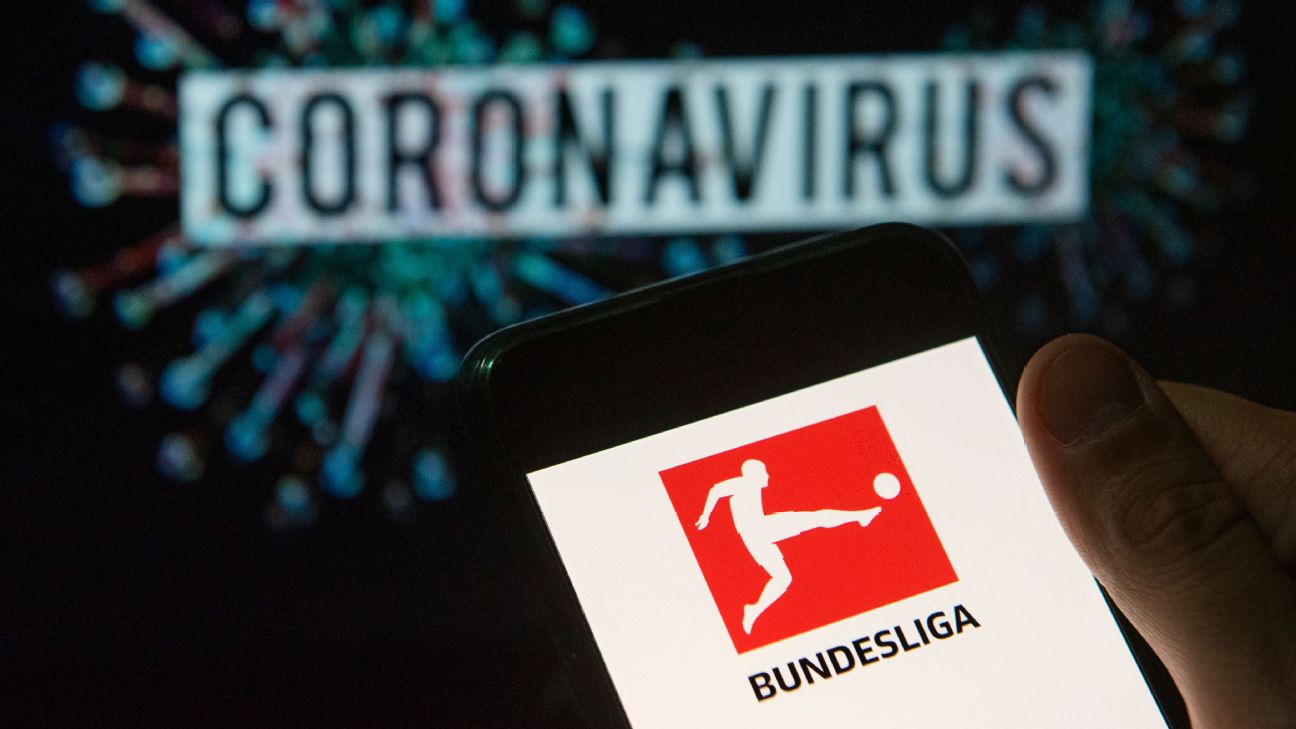Products You May Like
The Bundesliga in Germany is set to become Europe’s first major football league to resume playing during the coronavirus pandemic, with a restart confirmed for this month, it was announced on Wednesday.
Germany’s government and its federal states have given the green light to start again, with the date due to be decided when the German Football League (DFL) meets for an Ordinary Assembly on Thursday. The earliest possible return date is May 15, with a May 22 start also considered.
– Stream new episodes of ESPN FC Monday-Friday on ESPN+
- Stream every episode of 30 for 30: Soccer Stories on ESPN+
- ESPN+ gets Bundesliga rights starting in 2020
The league has nine matchdays remaining, and there is a commitment to finish the season by June 30. Fans will not be allowed into stadiums, with a ban on mass gatherings in Germany until Aug. 31. Bayern Munich lead the Bundesliga by four points.
Christian Seifert, chief executive of the DFL, said: “Today’s decision is good news for the Bundesliga and the Bundesliga 2.
“It is associated with a great responsibility for the clubs and their employees to implement the medical and organisational requirements in a disciplined manner.
“Games without spectators are not an ideal solution for anyone. In a crisis threatening the very existence of some clubs, however, it is the only way to keep the leagues in their current form.”
“The eyes of Europe and all of the world will be on us,” Germany and Bayern Munich captain Manuel Neuer wrote in an op-ed in German broadsheet FAZ on Wednesday. The goalkeeper highlighted the responsibility on German football’s shoulders and said it has acted as a role model for society.
Football players’ status as role models came into question after Hertha Berlin forward Salomon Kalou livestreamed a video of himself greeting teammates with physical contact and bursting in on a teammate’s coronavirus test. The former Chelsea player was suspended by the club on Monday and later apologised.
Some have voiced fears that fans could gather outside stadiums during the geisterspiele: the games without fans. But several leading Ultra and supporter groups have said they have no plans to do so, even though some have rejected the idea of football without fans.
Seifert, as well as influential club chiefs such as Borussia Dortmund‘s Hans-Joachim Watzke and Bayern Munich’s Karl-Heinz Rummenigge, have warned that cancelling the league would put around 56,000 jobs in the industry in danger. Following negotiations with the broadcasters, Seifert secured crucial payments of around €280 million from the rights holders as some clubs feared for their survival amid the pandemic. Bundesliga club FC Schalke 04 called the crisis “existence-threatening.”
Bundesliga teams resumed training in small groups in early April as the DFL worked on plans to bring back the league with a medical concept for training and match operations required by the government and its federal states.
Players and staff have been tested for the coronavirus, and in a first wave, 1,724 tests were conducted on all 36 clubs of the upper two tiers late last week. Ten cases of COVID-19 were identified and reported to health authorities. Not all cases were made public, as the DFL asked clubs not to report cases individually. Full results from a second round of testing have yet to be released, although on the eve of Wednesday’s decision, second-division club Erzgebirge Aue put their entire squad in home isolation after a member of staff tested positive.
Infected people must isolate, but the DFL’s plan does not require full-squad isolation. The league has asked clubs to go into the final part of the season with a squad that can be filled with reserve or under-19 players.
Political decision-makers have sent mixed signals on what will happen if a player or staff member tests positive for COVID-19.
“I don’t know how the season can be finished if one team is sidelined,” Anja Stahmann, the chair of the German sports minister conference, told Sport1.
Germany’s first COVID-19 deaths were reported on March 9, and the league was suspended on March 13.
“Corona is under control,” Bavaria’s minister-president Markus Soder said on Tuesday when announcing the lift of several restrictions in the German federal state hit hardest by the coronavirus.
According to numbers released by the Robert Koch Institute on Wednesday, Germany had 164,807 confirmed cases of the virus, with over 137,000 people recovered and 6,996 deaths.
Elsewhere in Europe, France, Belgium and the Netherlands have cancelled their seasons, and Italy, Spain and England are hoping for a possible June return.
